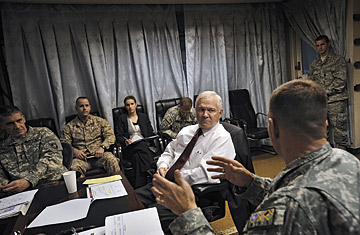
Gates being briefed at Camp Eggers in Kabul during a tour of Afghanistan last December.
(10 of 12)
Gates and Clinton have forged a formidable partnership. "They were both clearly very hardworking students in school," says a Pentagon aide. They speak frequently on their secure phones, comparing notes before they go to the White House. They meet once a week and have lunch at either the Pentagon or State every month. ("The notion of Condi and Rumsfeld having lunch together? Or Rumsfeld and Powell?" says a Clinton staffer.) Not long after the war-council meetings drew to a close and Obama gave his West Point speech, I asked Clinton about Gates' methods. "He listens more than he talks. He is very careful about when he intervenes and what he says because he knows his words carry a lot of weight," she said. "I think his ability to lead in a quiet and determined way carries a lot more influence," she added. For his part, Gates told me it was key to his success that from early on, "Clinton and I were on the same page."
And yet, though everyone talks about bringing soft power and a civilian surge to Afghanistan, in reality there are very few civilians to surge with. From the moment Gates put McChrystal in charge of the war, the military usurped control of the Afghanistan debate; ambassador Richard Holbrooke, who reports to Clinton as her special envoy to the region, was relegated to the sidelines.
Upon arriving in Kabul last spring, McChrystal flooded the Afghan countryside with counterinsurgency experts who came up with dire assessments and stated a need for more troops. Even Gates seemed blindsided by his own general. Gates had been public about avoiding a big American footprint in the Pashtun countryside. But after the McChrystal team's findings began leaking, Gates shifted course. To me, he said, "Once McChrystal said, 'This is what I need,' then I was there. And my goal was, how do we get Stan McChrystal as much of what he's asked for as quickly as possible?"
To his credit, Gates is mindful that the U.S.'s diplomatic assets pale in comparison to its military power. The Pentagon budget is still $660 billion, compared with State's $51 billion. To audiences, Gates often bemoans the fact that the State Department's foreign-service officers would barely crew one aircraft carrier. "We joke that Gates is the best surrogate for the State Department. He always makes the point that we are underfunded and underresourced," says a Clinton staffer. At the same time, the Pentagon has assumed more of the burdens of diplomacy and statecraft. The building contains its own mini State Department, with regional deputies and country officers making policies. And that whole structure is replicated at the office of the Joint Chiefs of Staff.
